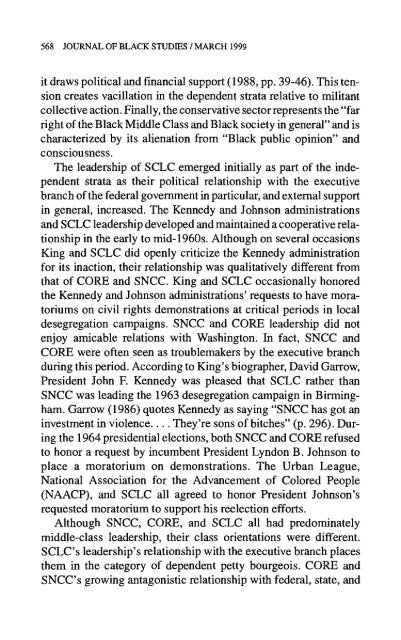MXGM Self-Defence Manual
MXGM Self-Defence Manual
MXGM Self-Defence Manual
Create successful ePaper yourself
Turn your PDF publications into a flip-book with our unique Google optimized e-Paper software.
568 JOURNAL OF BLACK STUDIES / MARCH 1999<br />
it draws political and financial support (1988, pp. 39-46). This tension<br />
creates vacillation in the dependent strata relative to militant<br />
collective action. Finally, the conservative sector represents the "far<br />
right of the Black Middle Class and Black society in general" and is<br />
characterized by its alienation from "Black public opinion" and<br />
consciousness.<br />
The leadership of SCLC emerged initially as part of the independent<br />
strata as their political relationship with the executive<br />
branch of the federal government in particular, and external support<br />
in general, increased. The Kennedy and Johnson administrations<br />
and SCLC leadership developed and maintained a cooperative relationship<br />
in the early to mid-1960s. Although on several occasions<br />
King and SCLC did openly criticize the Kennedy administration<br />
for its inaction, their relationship was qualitatively different from<br />
that of CORE and SNCC. King and SCLC occasionally honored<br />
the Kennedy and Johnson administrations' requests to have moratoriums<br />
on civil rights demonstrations at critical periods in local<br />
desegregation campaigns. SNCC and CORE leadership did not<br />
enjoy amicable relations with Washington. In fact, SNCC and<br />
CORE were often seen as troublemakers by the executive branch<br />
during this period. According to King's biographer, David Garrow,<br />
President John F. Kennedy was pleased that SCLC rather than<br />
SNCC was leading the 1963 desegregation campaign in Birmingham.<br />
Garrow (1986) quotes Kennedy as saying "SNCC has got an<br />
investment in violence.... They're sons of bitches" (p. 296). During<br />
the 1964 presidential elections, both SNCC and CORE refused<br />
to honor a request by incumbent President Lyndon B. Johnson to<br />
place a moratorium on demonstrations. The Urban League,<br />
National Association for the Advancement of Colored People<br />
(NAACP), and SCLC all agreed to honor President Johnson's<br />
requested moratorium to support his reelection efforts.<br />
Although SNCC, CORE, and SCLC all had predominately<br />
middle-class leadership, their class orientations were different.<br />
SCLC's leadership's relationship with the executive branch places<br />
them in the category of dependent petty bourgeois. CORE and<br />
SNCC's growing antagonistic relationship with federal, state, and


